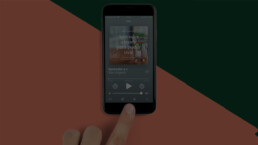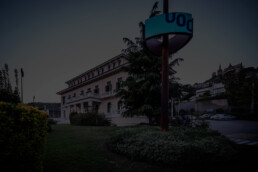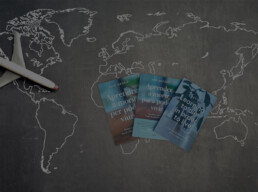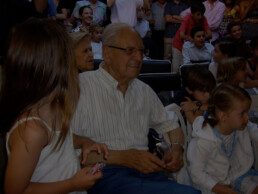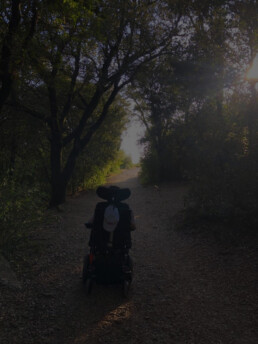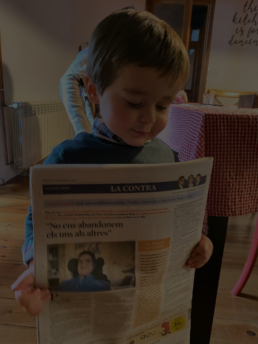Next stop, France
My book has reached a new phase, the fourth, in its journey to reach other readers: the publication of the French edition. Everything has evolved naturally, one language leading to another. After seeing that the English edition had generated some interest (although it wasn’t a big success) and that the promotional means were limited, I decided to continue exploring new audiences.
I know several people who live in France or French-speaking countries, and this made me think it would be a good opportunity to translate and distribute the book in French. So I decided to get to work and make it happen.
The Translation Process
The first person who offered to do the translation was a retired friend who has always shown great interest in everything related to France and speaks French fluently. I’m very grateful to him, as he made the first version with great dedication and enthusiasm. However, I knew that a native French speaker needed to review the text to ensure its quality.
At this point, a relative of my father’s stepped in. She’s the daughter of a German father and a French mother and is perfectly fluent in both languages. She has also spent many years teaching languages. I asked her if she could correct and fine-tune the first version, and she gladly accepted. In a couple of months, she had the final translation ready, and I must say it turned out great.
Over the past year, I’ve been studying French to be able to read the book carefully and ensure that the translated text remains true to the original. I think this effort has helped me ensure that the message stays intact in the new version.
Search for a Publisher in France
The next step was to find a publisher interested in releasing the French edition. To do so, I contacted a friend who has been living in Paris for many years and had read my book. He really liked it and offered to help me. In addition, he had run a publishing house for many years and knew the publishing world in France very well. He also had many contacts in the publishing industry.
This friend committed to finding a publisher interested in my book. We thought it would be a good idea to release it in the summer of 2024, coinciding with the debate on the euthanasia law in the French National Assembly. Perhaps my book could provide a useful perspective in that context.
My friend first contacted his old publishing house. Although they initially showed interest, they eventually decided not to publish it for reasons of overflow. Fortunately, he kept looking and finally found a Parisian publisher, Pierre Téqui, who was very enthusiastic about the project and wanted to move forward with it.
Publication in France
After a few weeks of negotiations, we signed a contract with Pierre Téqui to publish the book in French. The edition will be titled Ma Vie Jusqu’au Bout (“My Life Until the End”) and will be available starting November 13th in French-speaking bookstores and on Amazon.
This new title reflects the book’s central message: living fully until the end, even in the most difficult moments. I’m thrilled that the book will reach a new audience, and I hope it can inspire and help many people who have yet to discover my story.
Acknowledgments and diffusion
I want to thank everyone who made this new step in my book’s journey possible: my retired friend for his initial translation, my relative for her impeccable revision, and my friend in Paris for finding a publisher who believed in this project.
I also encourage everyone who knows French-speaking people who enjoyed my book to help spread the word. Ma Vie Jusqu’au Bout is now available for pre-order, and I hope it reaches many French-speaking readers soon. If you’d like more information, you can find the book doing click here.
So, next stop: France.
The Process Behind The Audiobook
A few weeks ago my book "Learning to die in order to live" was published in audiobook format, for now in Spanish. In this article, I want to tell you how this new edition came about.
The Origin of the Idea
It all started when I wanted to write an article, I was looking for phrases to publish and I wanted to be prepared for future interviews or editions in other languages. To do this, I needed to refresh my memory with a reading. As reading makes me very tired because I strain my eyes, I thought that if someone would do the book's locution for me, it would be much easier.
So I asked a friend of mine who in the last few years has voiced several audiobooks. He told me he would be happy to do it, and he did it in Catalan and Spanish. Although these versions have not been published, I have kept them for personal use. From here, I thank him for leading the way.
The Production Process
I sent the voiceovers recorded by my friend to my publisher, who has the audiovisual publishing rights in Catalan and Spanish. Initially, they asked me for a specific audio format for the edition, so I had to convert the original audio. Despite the excellent work of my friend, who did it with all his illusion, they were not convinced because they wanted a more professional recording. They wanted a dubbing actor used to long recording sessions in a studio.
They told me that for now they would publish the Spanish version and that they would let me connect live to the studio during the recording, so we met for a couple of days and I met the voice actor and the sound technician in charge of editing the audiobook. My impression was that they are very nice people and they loved my book. Jordi, the actor, found it very inspiring, and I think that's why the voiceover came out so well.
Recording in the Studio
The process was as follows: he would read the book and, from time to time, if he made a mistake, he would repeat the wrong part as many times as necessary. Also, if he had doubts about pronunciation or context, he would ask me or let me interrupt him if the doubt was mine or if I wanted to correct it.
A couple of nice touches they had with me were that they let me record with my voice a little updated introduction and dedication for this edition, and allowed me to add some context updates to the book. It has been almost four years since the first publication.
Objective and Future
I believe that with this edition I am going a step further, since my intention is to reach people who are blind or have any visual or physical difficulty that prevents them from reading the book on paper or digitally, in a way that is pleasant to the ear. Also, according to what I have been told from the publisher, it will be in great demand, especially in South America, where most audiobooks are listened to, probably partly because of the difficulty to acquire the book in paper. I hope it can help other audiences who do not know my story. In this link you can access the website to download the audiobook, available on Audible (Amazon), Apple Books, Google Play Books and Rakuten Kobo.
To conclude, I would like to make an exclusive announcement: the French edition of the book is already underway to reach France and other French-speaking countries in Africa.
A conversation about life and death: an interview with Isabel Gemio
When I published the Spanish edition of my book “Aprender a morir para poder vivir" (Grijalbo 2021), I had the opportunity to participate in several interviews. However, one in particular stood out for its depth and emotionality: the interview that Isabel Gemio gave me via videoconference.
Isabel Gemio, a well-known Spanish television presenter, has become very popular thanks to programs such as “¡Sorpresa sorpresa!”, on Antena 3. This program is a Spanish version of the Italian or British TV Show “Surprise, Surprise”, focused on making the dreams of anonymous people come true live, has marked an era in Spanish television. His link with the program and his outstanding career are known to many.
Connecting Experiences: Isabel Gemio and Duchenne Foundation
Our connection, however, goes beyond television and the interview. Isabel and I share a common experience: Duchenne. One of her sons also suffers from this muscular dystrophy, a reality that she made public a few years ago. Since then, Isabel has founded a foundation dedicated to raise funds for the research of minority diseases such as the one affecting her son.
FUNDACIÓN ISABEL GEMIO is a foundation for the Research of Muscular Dystrophies and other Rare Diseases, was born in 2008. Its aim is to contribute to accelerate research in Muscular Dystrophies, other Neuromuscular Diseases and Rare Diseases, in biological, physio pathological, genetic or therapeutic aspects. This research may have an impact on the development and application of curative treatments for those impacted.
Interview for YouTube channel
It was an honor for me to dedicate a copy of my book to him, and even more so when he decided to contact me to propose an interview for his YouTube channel, where he presents other relevant conversations. During our meeting, we addressed deep topics such as life and the euthanasia debate, sharing different perspectives and reflections.
For Isabel, the interview was emotional, as it meant connecting with someone who shares the same reality as her son. Through this platform, we were able to share experiences, reflections and, above all, hope.
I sincerely thank Isabel Gemio for giving me this opportunity for a deep and sincere dialogue. It is an honor to be able to share with you the result of this conversation, which I invite you to watch in the following video.
Life gives us opportunities to meet and connect with people who share our struggles and hopes. Through this interview, we have been able to explore this connection and bring a sincere and enriching look at life and its fragility. May this conversation be an inspiration to all those who seek to understand, share and, above all, live each moment to the fullest.
Interview on Aceprensa
On this occasion, I want to share with you an interview conducted by the digital media Aceprensa, led by Luis Luque in December 2020. In this conversation, we explored my life experience, marked by a constant struggle against Duchenne muscular dystrophy, a serious genetic disease. With the support of my family and other fundamental pillars, I have learned to embrace life with positivity and overcome daily challenges. Through this interview, I aim to convey the importance of solidarity and the value of preserving life and dignity in the face of discussions about euthanasia that are debated in the current social context. It is my hope that this conversation can inspire reflection and understanding of the complexities surrounding this issue.
Interview Aceprensa - LUIS LUQUE, DECEMBER 21, 2020
"Euthanasia causes tremendous pressure for many patients"
Xavi Argemí is 25 years old, but he savors certain details of life as perhaps only older people do. He enjoys quiet conversation, the contemplation of the sunset, the presence of emotionally close people, even when nothing extraordinary is said...
He suffers from a serious illness: Duchenne muscular dystrophy, a genetic disorder that usually begins to manifest at a very early age, and its symptoms range from severe muscle weakness to spinal deformity, severely affecting lung capacity.
However, Xavi does not live immersed in sadness. He has written a book: Learning to Die to Live. Small things that make life wonderful (Rosa dels Vents, 2020), with which he wants to share his experience and help people in similar situations. The young man from Barcelona confesses to being "happy," and he is clear that those who, due to serious and incurable illnesses, face death head-on need companionship, not a push towards death.
Xavi has kindly answered a questionnaire sent by Aceprensa. He tells us that he was born in Sabadell and is the youngest of nine siblings. The degenerative disease "causes me to lose more and more strength: I went from walking when I was little to being in a wheelchair with very little mobility, but I can still move my hands a little. The most serious problem is pulmonary, which can be complicated by any bronchitis I catch. Currently, life expectancy is 30 years."
— A condition of this severity can make anyone lose the joy of living. What has happened in your case?
— I have been fortunate to always have my family by my side. The support of my parents and their upbringing has been fundamental. They educated me in strength and, at the same time, naturally as one more. Specifically, my mother has always made me consider the positive side of life: not thinking about what I can't do, but about the possibilities I still have, despite the limitations. In this sense, faith has helped me, valuing the small things we take for granted, and the support of friends and family.
— I know that, in addition to the book you have written, you are finishing a university degree...
— I am finishing a Multimedia degree at the UOC; I really like graphic design and look forward to starting to work. The idea for the book came because I thought that by explaining my life experience, I could help many people in similar situations. And now I see that I have helped many more people than I thought.
"The fundamental pillars of my life are family, friends, spiritual support, emotional, psychological, and medical; specifically, now, palliative care."
— The disease has not prevented you from taking these steps. How are you coping? What have been your main supports to move forward?
— There has been a process of many changes regarding the disease in recent years. Now I need help to carry out tasks; however, technology has advanced a lot, expanding my possibilities to do more things, even with many limitations.
The fundamental pillars of my life are family, friends, the spiritual support that encompasses this, the emotional, the psychological, and medicine; specifically now, palliative care.
— To what extent have these helped you?
— They have improved my quality of life. For example, the back operation in 2010 was very tough, but it straightened my spine. If it weren't for that, I probably wouldn't be alive because I was shrinking more and more, and there would have come a time when my lungs couldn't function properly.
— Have you ever experienced hopelessness, discouragement? How do you overcome them?
— Like everyone, I am human and have ups and downs. Every day I have to fight to get up again and think positively. I try to think about what I can do and what I can contribute to others. In my opinion, as we focus more on others, we become happier. I also believe that everything I do has a spiritual significance, that is, since I am a believer, I believe there is another life with full justice and happiness, and that Someone is by my side. Not everyone has faith, but we all have emotions that need to be learned to manage.
Taking life, cheaper than investigating
Xavi gives his testimony precisely in the days when the PSOE and Unidas Podemos are pushing full steam ahead, without considering the opinions of palliative care experts and ignoring the opinion of the Bioethics Committee of Spain, a bill regulating euthanasia for patients with incurable diseases. The Congress of Deputies approved it on December 17 by 188 votes in favor and 138 against, and if it passes the Senate, it must come into effect no later than April, although Vox threatens to file a constitutional appeal against the text.
But the voices from political opposition or specialized centers are not the only ones against it. Also, the voices of potential "beneficiaries" of a measure that, according to the government, responds to a "sustained demand of current society," even though there is no data to support it, are rising.
Jordi Sabaté Pons, 36 years old, suffering from amyotrophic lateral sclerosis (ALS), is certainly not one who has demanded anything. In fact, he, who tells El Mundo that he cannot speak, eat, or drink, and breathes with great effort, has reasons to be wary of the pending law.
"I'm afraid that now, after this law, there will be a lack of investment in research, that ALS and other diseases will continue without a solution, and that the culture of death will be encouraged." He is concerned that people in his condition will be "forced to die for lack of human and economic resources. That the health system, over time, will lose resources and efforts to cure us or guarantee us a dignified life." In his view, those patients who, more than a "dignified death," want to live a dignified life will be even more abandoned with the new law.
The solution is not to give seriously ill patients the option of euthanasia, "but to invest in ensuring they have a good quality of life."
Xavi also speaks about the nonchalant way in which the ruling parties are handling this matter, without truly putting themselves in the shoes of those affected and closing their eyes to solutions that would not hasten death.
— For some, especially in the political sphere, a "solution" to the discouragement experienced by patients with incurable diseases would be euthanasia. The idea is that recognizing this "right" would promote the autonomy of the patient. What do you think?
— I don't think so; on the contrary: I think it makes many patients feel like a burden to society and puts tremendous pressure on them.
What we, the patients, need is society's support, to alleviate our pain. We must protect the right to life because every life is dignified; everyone has problems, even if some have many limitations. The solution is not to give them that option but to invest in ensuring they have a good quality of life and discover the meaning of it.
— Why do you think a part of the population (including most political representatives) tends to see euthanasia as a kind of "lesser evil" compared to preserving the life of a seriously ill patient until their natural end?
— Because they have not delved into the consequences of this law, which can drag many people who have never considered ending their lives to consider it and end up deciding to die. I also think that, in general, we are in a selfish society that only thinks about its interests. And they haven't listened to the experts either.
— What would you say to those who, having never been in a condition like yours, believe it is time to have a "dignified death" law?
— Well, they should put themselves in the shoes of the sick and think about what can be done so that they can have a dignified life without resorting to death. The problem is more complex than they think. I believe that the best solution is palliative care, which provides support, alleviates pain, and helps give meaning to life.
"My God, one more day of lucidity, not just one more day of life”(2/2)
In the first part of this article, I addressed the famous phrase that my grandfather used to say, emphasizing the importance of lifelong learning, as we are in a constant process of learning. I also shared with you an interview conducted by La Farga School, where I spent my entire school years.
Now, in this second part of the article, I want to involve you in the interview that Ángeles Doñate of Open University of Catalonia (UOC) conducted with me in 2020. At this university I completed my Bachelor's degree in Multimedia between 2014 and 2021. In the book, I explain in detail how this experience was. For me, it was a valuable opportunity because, due to my health condition, studying remotely allowed me to adapt to my health needs at all times. Despite the distance, I was fortunate to have a tutor who cared deeply about my needs, and I dedicate this article to him as a token of gratitude.
One aspect that caught my attention was the UOC's continuous assessment system, which I find very interesting and useful. This system allows you to directly apply theory to practice. However, it must be acknowledged that there were times when academic demands were rigorous, with up to five assignments to submit simultaneously. I now invite you to read the full interview.
Xavi Argemí, Bachelor's Degree in Multimedia student and author of Aprendre a morir per poder viure
In the words of the writer Jose Luis Sampedro, "death is the companion of life. We begin to die the day we are born and we need to understand how to make the most of it." The quote would suggest that this humanist would have had much in common with Bachelor's Degree in Multimedia student, Xavi Argemí, who has just published his own book, entitled Aprendre a morir per poder viure [Learning to die to be able to live], in which he outlines his personal experiences and thoughts on the subject, infused with a sense of joy and hope. As a child, Xavi was diagnosed with Duchenne muscular dystrophy, a degenerative disease characterised by progressive muscle weakness. Now twenty-five, his movement is restricted to his fingers and head, which means he needs assistance to carry out the majority of his daily tasks and is confined to a wheelchair. As he explains in his book, which marks his debut as an author, death and his own mortality are everyday realities which he has learned to live with.
What made you decide to write this book and share your story?
It's something that some of my friends and family members have been saying I should do for a long time to tell people about the way I see life, but I've always been reticent because I don't want to be in the spotlight. The thing that convinced me was the thought that it might help people who find themselves in similar circumstances to mine. It all started with a letter I wrote to La Vanguardia expressing my support for palliative care in the debate about euthanasia. That led to me being interviewed for the TV3 programme, Planta Baixa, which, in turn, led to the Rosa dels Vents publishing house approaching me about writing the book.
Can you tell us about why you feel that life should be lived to the natural end?
Euthanasia is a treatment to bring about my death. And I want something else from medicine: to be treated because I'm dying. To put it another way, it's much better to invest in supporting people with what they're going through. Palliative care provides a much better response all round, both for me and for those close to me. It addresses the things people want: to feel adequately supported, to be free from pain, to allow nature to take its course and enjoy the life we still have. Euthanasia is not about political leanings, life and the right to live transcend that kind of discourse. To me, my objections to euthanasia as a solution are human, not political.
What are your own hopes for the future?
To enjoy the little things in every moment, to share projects with others, participate in everyone's joys and help ease their difficulties and sorrows.
Who did you write this book for? What did you want to convey to them?
I was thinking about people in situations similar to mine and the people close to them. And people encountering difficulties of any kind. I wanted to convey a message of hope and tell them that you can be happy despite any limitations or problems you may have and to learn to value the little everyday things that we often overlook.
What is a typical day in the life of Xavi Argemí like?
Apart from daily personal care routines, I try to be as active as possible and focus on things that I enjoy: studying and working to finish my Multimedia degree, chatting with friends and, now, answering emails and social media posts from people who have read the book, family, etc. All very routine and at the same time very different every day.
What makes you happy in life?
Being with the people I love, enjoying their projects and sharing mine. I had a very happy childhood thanks to the family I have.
What are the cornerstones of your life?
Family, friends, spiritual support and medicine.
Tell us a bit about your family
There are four of us at home now: my parents, one of my sisters and me. They are my lifeblood, I need them all the time, both day and night. On top of the physical aids I have, they support me in every way. In fact, they are my arms and my feet. Apart from that, everyone needs company and psychological and human support.
As a child, you were able to lead a life like that of any other child your age: playing football, running around, riding a bike, going to school, etc. I understand that your movement is now restricted to moving your mouse or typing on your mobile phone.
I was always aware of my physical limitations but the functional loss has been progressive. As my falls became more and more frequent at school and at home, I became aware of being different. Little by little, I stopped being able to do things that other kids my age did: playing ball, climbing stairs, and so on.
Have you ever felt angry or a sense of helplessness about your situation?
We all have difficult times, but I've always managed to keep going. Even now there are still times when I wish I could be cured.
You mentioned the importance of spiritual support... Why?
Christianity brings me hope and a sense of existence, the fundamental requirements for happiness.
What made you choose the UOC and decide on Multimedia as an area of study?
I couldn't attend a traditional on-site university because of my condition. The UOC has an excellent reputation so I thought it would be a good option. Why Multimedia? Because I wanted to do something in the digital world and because I was drawn to the world of graphic design, which one of my sisters introduced me to.
What has your experience as a student been like?
Very good, overall. Especially because of people like Antonio Ponce, who has been my tutor for the majority of the time I've been studying and because of how easy it is to communicate with my teachers and classmates.
If you look to the future, are you afraid, do you feel sad?
I don't feel sadness or fear but I do think about the difficult times that may come. But the fact that I've already been through some of it gives me some peace of mind. But death commands respect.
Translating Experiences: From Catalan to English
A few months ago, the English edition of my book titled 'Learning to Die in Order to Live: Little Things that Make Life Wonderful' was finally published on Amazon. (See in what Amazon Stores you can find it on About my book Page)
This project began to take shape shortly after the Spanish edition, as the next step due to its positive reception and the way it was helping so many people with different problems and situations. I wanted it to reach individuals from all over the world, and what better way than to publish the book in English, a nearly universal language!
The process took 2 years.
Challenges and Decisions
Concerning the translation, it was important to me that someone who knew me, understood the original meaning of what I was conveying. And preferably someone who grasped the original language, Catalan, be the one to handle it. Since I had a brother living in Hong Kong (where English is widely used), I asked him to undertake the translation. Simultaneously, he thought it would be better if a friend of his, a British man who had spent time in Catalonia and knew Catalan, did the translation. Then, my brother would review it to ensure it maintained the same essence as the original. And so it was, it turned out very well, and he even added notes and context to help English speakers who might not be familiar with certain expressions or aspects related to Catalonia.
Once translated, I needed to manage the transfer of copyright for the English translation and find an interested publisher. I began the search by speaking with contacts and exploring options online. Soon after, a friend of my brother from Pamplona, who had spent some time here, contacted me. He mentioned that he had really enjoyed my book and that it had helped him in a difficult situation. This friend is a priest who has lived in Kenya for many years. He encouraged me to publish in English to reach people in that country. He also connected me with a publisher in Kenya for a potential publication in Africa. While that would have been great, time passed, and unfortunately, it didn't come to fruition.
In the end, I realized that finding a publisher interested in the English edition was more complex than I had thought, so I decided to take the initiative and self-publish the translation.
The Publication Process
I discovered that I could do this through Amazon's Kindle Direct Publishing platform, following a few simple steps once I had the manuscript and cover in the required format. To proceed, I needed to obtain copyright permission. I received support, as always, from my Catalan editor throughout the process.
It took me several months to finalize the edition, as I had to adapt the initial version to the appropriate format to match the size and layout of the text with editions in other languages. My sister, a graphic designer, collaborated on the design, and the son of my Catalan editor, a photography student, contributed with the image. Thanks to their assistance, the result is excellent.
To ensure there were no grammatical errors, spelling mistakes, or misinterpretations, I had my Canadian brother-in-law review the final manuscript, along with his mother. Once the necessary corrections were made, I uploaded the manuscript in PDF and ePub formats to Amazon's Kindle Direct Publishing application. After providing all the required information, I published the book. Within about three days, it was available in both print and electronic formats. Then, I began promoting it among English-speaking friends and contacts, as well as those who knew people who spoke English.
During these initial months, the English edition has sold around 100 copies internationally, reaching Australia, Canada, and the United States. I want to express special gratitude to all who have supported me and contributed to this project.
Experience exchange
In summary, the translation process has been quite intense, but ultimately, the goal of publication has been achieved. I hope that by sharing my experience in this way, I can help many more people in various situations, as has been the case with the other editions. The exchange of experiences enriches both the author and the reader. Ultimately, every human being needs to connect with others to learn and provide mutual support in the process of overcoming life's challenges and obstacles, ultimately finding a horizon.
"My God, one more day of lucidity, not just one more day of life”(1/2)
"My God, one more day of lucidity, not just one more day of life", my paternal grandfather, Joan Argemí Fontanet, often said in family gatherings. He also said it in the sense that studying is a key tool to have a horizon and not lose understanding. This has made me reflect on how the curiosity to learn new things can have a positive impact on life. My grandfather placed great importance on education, which led him to become a great pediatrician and get involved in numerous initiatives in the city of Sabadell.
Despite the difficulties I have had to overcome to study and become a professional, I am convinced that education is a key tool for success. However, it is not always easy to keep up with the pace of the educational system and face the challenges that daily life with a disability entails.
But in the end, the most important thing is not to follow the exact rhythm set by the educational system, but to maintain curiosity for learning and keep fighting to achieve our goals. Life is a constant process of learning, and I am grateful for every opportunity I have had to grow as a person and professional. I hope to share my experience with studies through this series of interviews that both my school and the university where I studied have conducted. The interview that you can read below was conducted by La Farga, the school where I spent my entire school stage. It is located in Mirasol (Sant Cugat del Vallès). You can find my book on Amazon.
La Farga Interview
https://lafarga.institucio.org/ca/actualitat/entrevista-a-xavi-argemi-alumni-de-la-farga
Interview with Xavi Argemí, La Farga Alumni
He suffers from Duchenne muscular dystrophy and has just published the book "Learning to Die in Order to Live."
Xavi Argemí is a former student of La Farga. For years, he has been suffering from Duchenne muscular dystrophy, which causes him to lose strength in his entire body. He has just published the book "Learning to Die in Order to Live," where he tells his story. Xavi has agreed to give an interview to La Farga, which we offer you below.
You were a student at La Farga for several years, tell us the best memory you have from that time.
From that time, I have many memories, and especially it has given me most of the friends I have, which is one of the pillars I talk about in the book I recently wrote.
How do you think the school and your teachers helped you during your time as a student at La Farga?
They made me feel like one of them and did what was necessary for me to have a good education, access activities adapted to my physical situation in different school stages, and acquire the values I have.
When you graduated, what did you take from the school (values, lessons, something you learned) that helped you in the following years?
Values such as effort, perseverance, and companionship, and in general, good academic and human education.
Many students have a special memory of a particular teacher who left a mark on their student life. In your case, who do you think had an impact on your life and why?
I could mention several, but to give an example, in the last stage of high school, Mr. Josep Solé was very important to me. He was my last tutor and was always there for what I needed to cope with the hectic pace of the second year of high school, given my difficulties. In a short time, I had to prepare for the university entrance exams.
From your personal experience and point of view, what do you think makes La Farga different from any other school? What characteristics do you think or see as distinctive?
Especially the personalized treatment with each student according to their needs through tutoring or spiritual support. Also, the important Christian values that it teaches.
Putting your story into writing, your testimony, surely has not been easy. How did the idea of writing this book come about, what motivated you to do it?
You can find my story in the book "Learning to Die in Order to Live." I decided to write the book because I saw that it could help people with similar circumstances to mine have a positive and hopeful outlook on life.
You must have received many different reactions to the book, to your story. In general, what do people tell you? What is their feedback?
People tell me that the book has helped them a lot with any problem or circumstance they have, whether their own or someone close to them. The truth is that in their messages, they not only say that they liked it, but they also tell me about their situation and details of the book that they wanted to highlight. I didn't imagine that my book would have such an impact.
Your Duchenne disease has demanded great dedication from your family and educational environment in day-to-day details; it has also been a growth for them. How do you stay united in this when we encounter big or small problems, which we all have or will have?
Be grateful and appreciate all the good things we have. Also, focus more on others, thinking about what we can contribute to them. Thanks to God, we live in an area with many resources.
Xavi, in moments of discouragement or concern, what or who inspires you?
As I mentioned before and in the book, in the positive aspect of life, and for me personally, it's the faith I have and the support of family and friends.
You must have noticed that your good humor, full of frankness and optimism, is contagious and very motivating for your friends, acquaintances, teachers... Tell us a recent anecdote or one from when you were a child.
I have a friend who remembers that when I was hospitalized, he came with a few others to the ICU, and some family members took care of them. They were interested in my health condition, and someone mentioned that I was worried about university assignments. It impacted them and made them laugh a lot because they thought I would be more concerned about my health, which I was naturally. But it was a funny situation within the seriousness of the situation.
Tell us a dream that you encourage young people today to have.
I encourage them not to give up on what they set out to do and that despite the difficulties, we can achieve many things, and we must have hope.
If you had to give advice to the Xavi from a few years ago, what would you say to him? And what would you say to boys and girls who are in a similar situation to yours?
For example, I would tell them to differentiate well between problems and circumstances: circumstances are what you cannot change, and therefore, you have to accept them, and problems are what you can try to modify by seeking a solution.
YOU CAN FIND THE BOOK ON AMAZON
Problems and circumstances
One of the things that people who have read my book (Learning to Die in Order to Live) have pointed out to me is that the distinction between problems and circumstances that I make has been the most helpful thing for them. It is one of the most important things I have learned in my life.
As a person with a physical disability, I have had to face many circumstances that I could not change, such as my inability to walk. This situation forced me to learn to accept circumstances as they are and to focus on what I could change: my attitude and my way of seeing things.
However, I have also had to face many problems throughout my life, such as difficulties in accessing higher education or the job market. In these cases, I had to find ways to overcome them and find solutions that would allow me to achieve my goals.
In this sense, I believe that it is very important to learn to differentiate between circumstances and problems, as this allows us to focus our efforts on what we can really change and improve. In other words, if we face a circumstance that we cannot change, such as my disability, we must focus on accepting it and adapting to it. On the other hand, if we face a problem, we must find ways to overcome it and find solutions that allow us to achieve our goals.
For me, this has been a life lesson that has helped me to face difficult situations in life with a positive and proactive mentality. Not only has it helped me to overcome my own challenges and difficulties, but it has also allowed me to help other people do the same.
Believing in oneself and in one's own abilities is fundamental to achieving the goals we set for ourselves. It is important not to let life circumstances drag us down and prevent us from growing as individuals. Instead, we must see them as opportunities to learn, grow, and overcome ourselves.
In conclusion, I believe that the distinction between circumstances and problems is a fundamental skill for life, especially for those who, like me, live with disabilities or other difficult situations.
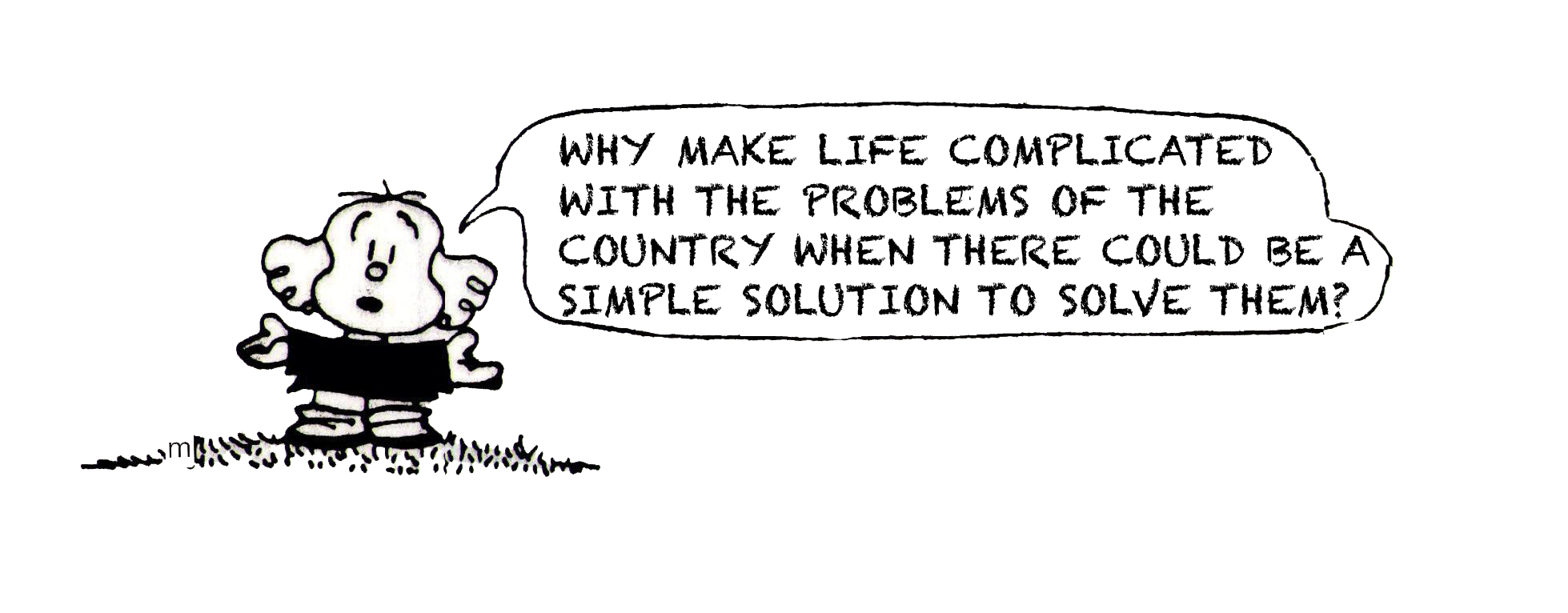
Interview at TOT Sant Cugat
One autumn afternoon, on November 19, 2020, Ramon Grau, a good friend of my uncle, president of the Association of Independent Media of Catalonia (AMIC) and director and journalist of the TOT mèdia group of which the local newspaper TOT Sant Cugat is a part, came to interview me on the occasion of the recent publication of my book. And why was a media outlet from Sant Cugat interested in interviewing me? Well, the interest comes from the fact that I am a former student of a school located in Mirasol, a municipality in the area: La Farga, where I spent my entire school years.
The interview was very pleasant, like a conversation between friends, but at the same time with great professionalism. Ramon came well prepared: a copy of my book underlined and full of notes, some sheets with questions, a blank notebook with a pen to jot down my answers, and a mobile phone with the recording app ready. With all this, he acquired all the material from which the interview and article emerged, which I share with you below. Thanks, Ramon! Conversations like this are part of the little things that make life wonderful.
Interview TOT Sant Cugat - Ramon Grau - November 19, 2020
Xavier Argemí, who suffers from Duchenne muscular dystrophy, has published the book 'Learning to Die in Order to Live'
Despite suffering from Duchenne muscular dystrophy, an incurable degenerative disease that makes him live in a wheelchair, Xavi Argemí (Sabadell 1995) is studying multimedia at the UOC. He was a student at La Farga school for twelve years and now publishes the book Learning to Die in Order to Live, a hymn to life by sharing the little things that make it wonderful. A book that is becoming a bestseller and helps us value what we have.
What would you say to young people like you, without your "circumstances" but with problems like being independent or finding a job?
We must value what we have, not what we can have. It is necessary to differentiate the problems that are the challenges that life puts before us and that we can or cannot solve, from the circumstances; which is what we have and cannot change. My problems are finishing my degree, working, my circumstances are the disease, not being able to move, eating with a feeding tube and depending on others. We overcome problems and do not dedicate our energies to circumstances that we cannot change.
In the book, you talk about euthanasia, which you have never considered, and you say that you want to "Live" in capital letters and make a firm defense of palliative care that has allowed you to build a meaningful life.
I do not want to suffer or make others suffer, medicine is very advanced and palliative care supports me and has helped me a lot, as well as my family. They support me and give me physical and mental well-being; enjoying a glass of water, a conversation, a Barça match, a sunset; the little big things in life.
You have been through surgery several times, until one day you said enough.
I started having crises and choking, I saw death near and before an intervention, tracheotomy, which meant not being able to speak, I decided not to do it and contacted a palliative care doctor to be able to stay at home with all the medical support and means that would give me the maximum possible well-being.
People say that you have never wanted to inspire pity, that you have sought normality in the eyes of others.
At home, I have always experienced it this way, my parents, my whole family, and friends have always made me feel normal, and that has given me hope and positivity to overcome the difficulties of day-to-day life. My parents have never hidden anything from me about the illness, but with a positive tone. Although we often talk about death, they have always made me see the kind side of life. We are a deeply Christian family, and faith helps me a lot.
Acceptance and sharing are the opposite of frustration. In the book, you make reflections that are more typical of someone who has lived a whole life than of a twenty-five-year-old.
Because the illness has accelerated in recent years, and I have had to face it, this has made me realize that happiness is knowing how to enjoy what we can do, without thinking about what we cannot. We must give thanks for what we have and what we can do, instead of complaining about what we do not have. When you accept your limitations, that's when you feel freer.
One of the great diseases of society is anxiety, depression, unhappiness...
I believe that happiness is also not focusing on yourself but on what you can do for others; sharing, celebrating their joys. We all have problems, and what is needed is to overcome them. My parents, educating me to die, have educated me to live fully. We must look at the positive side, especially focusing on others. To be happy, it is not necessary to travel to the other end of the world; we can enjoy the small things of day-to-day life. We must create a better society; we have seen this with the pandemic.
You often talk about Barça, Txarango, Manel. Does music help you a lot?
For my saint's day, my parents gave me tickets to see Manel at the Teatre Auditori de Sant Cugat, and I enjoyed it so much. Music is life, it is joy, refuge, and helps us to travel. My grandmother always said, "whoever sings scares away evil." Txarango one day made a video call to me, and so did Pep Guardiola, they are great gifts! Like nature, animals keep me company.
You are from Sabadell, their parents from Sabadell and Terrassa, and you studied in Sant Cugat and live in Matadepera, with spectacular views of the Vallès.
Yes, I have taken a photograph every day of the year of the sunset over the Vallès, always from the same place and at the same time. Three hundred and sixty-five photographs, the images are like life, which has many colors and shades, some days are gray, some bright.
Your grandfather always said: "My God, one more day of understanding than of life."
Yes, being able to reach the end with full lucidity and well-being. I am receiving many messages from people who thank me for the book, people who have lost a child, elderly people, teachers... They tell me that when they have a bad day, it is worth reading it. Just helping one person, I will feel satisfied.
Well, in a few days, it has already had three editions; it is an inspiration for many, especially for young people. It appears on the bestseller list alongside President Puigdemont, who, by the way, tweeted: "Today I finished reading it, but I will meditate on it for a lifetime." Many of us will, and we thank you from the bottom of our hearts.
Source: https://www.totsantcugat.cat/actualitat/societat/xavi
"Let's not abandon each other"
This is the phrase that stood out to Ima Sanchis from the interview she did with me for La Contra, the back page of La Vanguardia, a Catalan newspaper. I was very excited about the interview she did with me, because when I turned 18, my siblings made a fake Contra for me, and since then I had dreamed of having a real one. Well, the opportunity presented itself: Ima was very pleasant and we had a conversation as if we had known each other forever, talking beyond the book, about life, how I see it, and what I think is important to improve the world and solve the problems that exist in today's society.
Definitly, we had to have the conversation via Zoom for various circumstances. Something I didn't know is that she created La Contra and started it more than 20 years ago. This impressed me even more, since I think (and I'm sure many of you will agree) that it is one of the best interview styles created within journalism in the last 20 years: it is a plural space where all kinds of people with different points of view are given a voice to see things, and I think this is very enriching. I am very grateful to her for her kindness, and curiously enough, she likes dogs like me: I told her about Bruna and she told me about hers, Oliva. This is one of the little things that I consider make life wonderful, as I say in the book. Below, I share the complete interview with La Contra.
Font: La Contra, La Vanguardia, Ima Sanchis. 29/12/2020
"Let's not abandon each other"
I am 25 years old. I was born in Sabadell and live in Matadepera with my parents and one of my nine siblings. I studied Multimedia at UOC, I still need to complete my final project. Politicians must seek the common good, and that means fighting to save the planet. I believe in God and in life.
Xavi Argemí, with an incurable disease. Publishes ‘Aprendre a morir per poder viure’ (Learning to die to be able to live)
"Let's not abandon each other"
IMA SANCHÍS
Xavi's hope
Years are not on his side. Today, the atrophy of his muscles only allows him to move the fingers of his hand. He has an incurable degenerative disease, but Xavi also has many other things: an extensive family, friends, music, humor, his dog Bruna, a brave attitude and palliative care that helps him cope with the disease. "I have learned to live with death in sight. Or what is the same: I have been learning to die in order to live. And, paradoxically, my life is not a miserable life." He tells it in Aprendre a morir per poder viure (Rosa dels Vents). "I have the hope of taking advantage of the minutes, days, or years that I have left, of making life easier for those who are by my side, and, through the book, to as many people as I can."
"I can move my hands and head a little, although I can't hold it, and I need help with everything, even drinking water.
Was he born with an incurable degenerative disease?
I was diagnosed with Duchenne muscular dystrophy at the age of three, since then I have been losing muscle capacity. I know it is progressive. I know what it implies for it to be so. I know how everything will progress.
...
Don't worry, I have four pillars: family, friends, spiritual support, and medicine. Palliative care is my salvation.
His father is a pediatrician, his mother a nurse.
They taught me to live day by day, and by learning to die, I have learned to live. And it turns out that my life is not a miserable life. I have had many respiratory crises in which I thought I was going to die, but here I am, and I feel happy.
A survivor.
You learn, you have to accept that the end will come any day, but it will come to all of us, you have to keep that in mind but not obsess over it.
Do you achieve it?
I have my ups and downs, but I value what I have and what I can still do, like chatting with you, studying, enjoying a movie, music, fire... My list is endless. Daily life is full of small gifts.
We should all be more grateful.
I assure you that you can find happiness in a simple life.
Perhaps more than anywhere else.
My body has been atrophying, but my spirit has been gaining flexibility and acceptance. Perhaps the hardest thing has been distinguishing what the circumstances are from what the problems are.
What is the difference?
The disease is my circumstance. I don't like it, but I have to accept it to be able to see the good things around me. Studying has meant for me many problems of mobility, tiredness, capacity, a challenge that requires not resigning. I can face the problems, I must learn to carry the circumstances
What comforts you on a bad day?
Bruna, my dog, a German Shepherd who keeps me company and gives me a lot of love. And I have great views, I never miss a sunset. For a year, I took a photo of the sunset from the same angle every day.
And now, when I see all 365 photos of sunsets together, what do I think?
That there are days of all colors: gray days, sunny days, red days, blue days, rainy days, it's like life. It is life.
What are you up to now?
I have three baby chicks that I have given to my godson. They are in my house, and I have photographed them every day as they grow. It's an incredible transformation! My father takes the photos, and I direct, haha.
What has been the most difficult adaptation?
Stopping eating and having to feed myself through a tube. In my house, everything revolves around the table. But I can have a glass of sangria from time to time. You have to look at the positive side of life, don't you think?
That's very easy to say and very difficult to carry out.
It's a daily struggle. You have to build with what you have, and I am very lucky, surrounded by family and friends who love and accept me. They have also had to face my illness.
And how have your friends done?
Very naturally. They have never pitied me, they tease me just like they do with each other. Sometimes they put things on top of me as if I were a Christmas tree. I laugh a lot with them.
You have a good character.
Accepting your situation allows you to accept the help and love of others. And if you take your difficulties with joy, it also makes it easier for them. Accepting help from others is important, but not just for yourself.
Tell me more.
Doing something good for others forces you to go beyond yourself, and I think that's very good for society. A society of people who need and help each other is a better society.
We all need help.
Especially as we age. Let's not abandon each other. I think happiness is as simple as not focusing on oneself but on others. My life also has meaning.
What are your fears?
The unexpected, but I have hope that everything will turn out well.
Is that possible?
Expectations in a degenerative disease are always bad, but my parents were told I wouldn't reach adolescence, and here I am, because medicine is advancing, so it's better to live day by day.
I see.
Palliative care provides me with the necessary medication so that I do not suffer, and they accompany me psychologically, emotionally, and spiritually.
Have you ever considered euthanasia?
Never. If people had the care they needed, they might not want to die.

